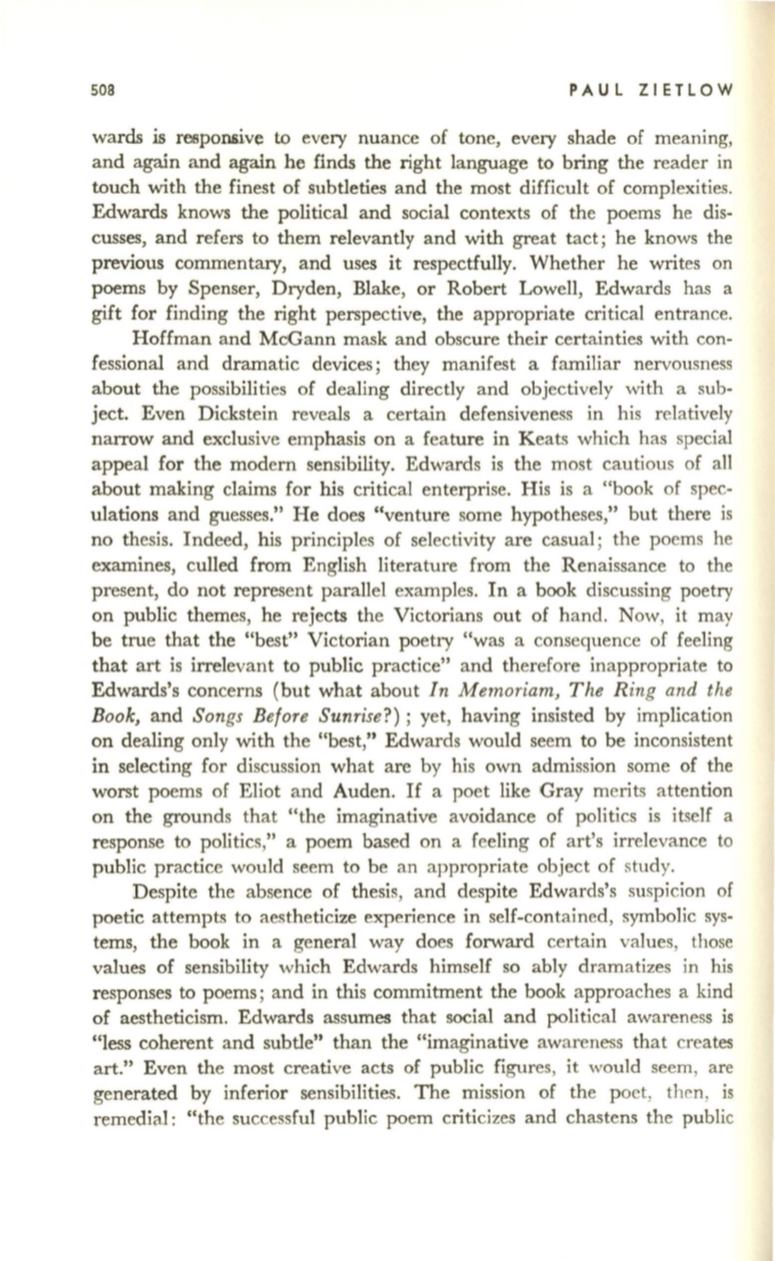
508
PAUL ZIETLOW
wards
is
responsiv~
to
every nuance of tone, every shade of meaning,
and again and
again
he finds the right language to bring the reader in
touch with the finest of subtleties and the most difficult of complexities.
Edwards knows the political and social contexts of the poems he dis–
cusses, and refers to them relevantly and with great tact; he knows the
previous commentary, and uses it respectfully. Whether he writes on
poems by Spenser, Dryden, Blake, or Robert Lowell, Edwards has a
gift for finding the right perspective, the appropriate critical entrance.
Hoffman and McGann mask and obscure
their
certainties
with
con–
fessional and dramatic devices; they manifest a familiar nervousness
about the possibilities of dealing directly and objectively with a sub–
ject. Even Dickstein reveals a certain defensiveness in his relatively
narrow and exclusive emphasis on a feature in Keats which has special
appeal for the modern sensibility. Edwards is the most cautious of all
about making claims for his critical enterprise. His
is
a "book of spec–
ulations and guesses." He does "venture some hypotheses," but there
is
no thesis. Indeed, his principles of selectivity are casual ; the poems he
examines, culled from English literature from the Renaissance to the
present, do not represent parallel examples. In a book discussing poetry
on public themes, he rejects the Victorians out of hand. Now, it may
be true that the "best" Victorian poetry "was a consequence of feeling
that
art
is
irrelevant to public practice" and therefore inappropriate to
Edwards's concerns (but what about
In Memoriam, The Ring and the
Book,
and
Songs Before Sunrise?);
yet, having insisted by implication
on dealing only with the "best," Edwards would seem to be inconsistent
in selecting for discussion what are by his own admission some of the
worst poems of Eliot and Auden.
If
a poet like Gray merits attention
on the grounds that "the imaginative avoidance of politics is itself a
response to politics," a poem based on a feeling of art's irrelevance to
public practice would seem to be an appropriate object of study.
Despite the absence of thesis, and despite Edwards's suspicion of
poetic attempts to aestheticize experience in self-contained, symbolic sys–
tems, the book in a general way does forward certain values, those
values of sensibility which Edwards himself so ably dramatizes in his
responses to poems; and in this commitment the book approaches a kind
of aestheticism. Edwards assumes that social and political awareness
is
"less coherent and subtle"
than
the "imaginative awareness that creates
art." Even the most creative acts of public figures, it would seem, are
generated by inferior sensibilities. The mission of the poet, then, is
remedial: "the successful public poem criticizes and chastens the public


